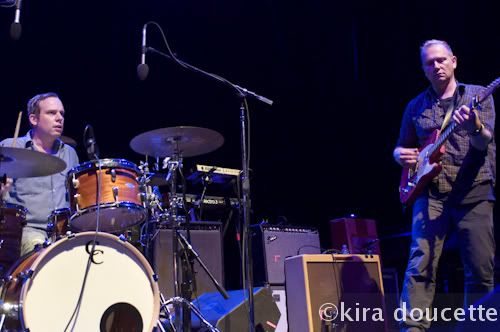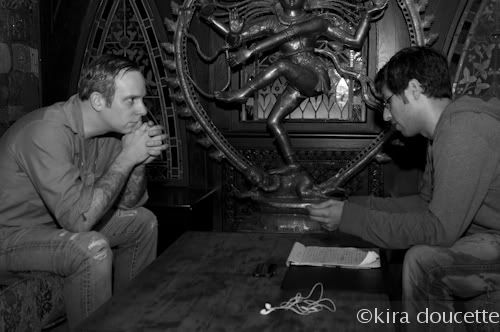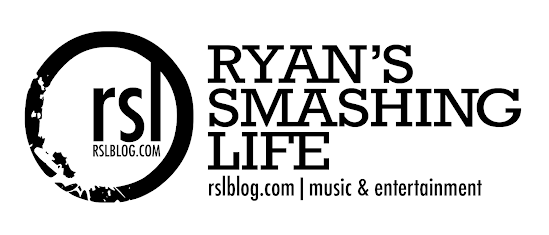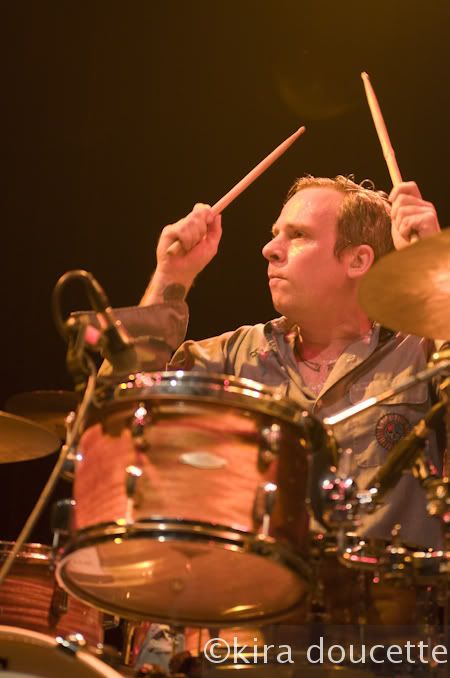Interview with John McEntire
Interview Series
Q&A by Corey Moses
I recently had the opportunity to speak with the producer, artist, and indie rock guru John McEntire of the bands The Sea & Cake and Tortoise. John recorded and produced the latest Broken Social Scene release Forgiveness Rock Record. At the time of this interview he was touring as a special guest musician with BSS as well as supporting the tour performing with Sea & Cake. We caught up with McEntire at the House of Blues Boston.
Corey Moses: "We’re at a Broken Social Scene show right now, how did you and BSS come to work together?"
John McEntire: "We have some mutual friends, people we worked with, tour managers.. Kevin (Drew) sent me an email about doing a remix for something on his solo record from whenever that was, 4 years ago, and I told him, well you know honestly at this particular moment I’m not really into doing remixes but you know if you want to work on something else at some point that’d be great. They just sorta had this brainstorm..., "why don’t we just come into to the studio for the day and just see what happens, no expectations." And so we did that and it went great, I don’t know if the tune that we came up with is, it might sit on the shelf for a while."
Moses: "How was the creative process with so many musicians in Broken Social Scene? Do Brendan (Canning) and Kevin bring the creative conceptual voice or do they come with concepts that need to be worked out?"
McEntire: "You know about a third of it was really well rehearsed and pretty much written completely and there were other things that were more like ideas or little jams and some of those actually developed into songs that ended up on the record, but I think we tended to focus more on the things that were pretty substantial to begin with, So that whole process was very straight forward, it was just your typical session in terms of the procedure. We spent time working on different overdubs and different ideas in that relm. I mean, it all went really smoothly, it just took a lot longer than I guess any of us expected."
Editor's Note: McEntire's toils are well worth it for fans. Broken Social Scene's Forgiveness Rock Record is on RSL's Best of List for 2010.
McEntire: I mean I was definitely trying to strike this balance between, I don’t know how to phrase this exactly, obviously not wanting things to be to clear but also opening it up a little bit so there more of a sense of spaciousness and depth and dynamics and things like that and in a certain sense I think I was already one step ahead of the curve because on the stuff that they had worked on they had done a really good job of arranging it and even though there’s 4 plus guitar parts happening on basically every song
Moses: "Horns and strings."
John McEntire: "We have some mutual friends, people we worked with, tour managers.. Kevin (Drew) sent me an email about doing a remix for something on his solo record from whenever that was, 4 years ago, and I told him, well you know honestly at this particular moment I’m not really into doing remixes but you know if you want to work on something else at some point that’d be great. They just sorta had this brainstorm..., "why don’t we just come into to the studio for the day and just see what happens, no expectations." And so we did that and it went great, I don’t know if the tune that we came up with is, it might sit on the shelf for a while."
Moses: "How was the creative process with so many musicians in Broken Social Scene? Do Brendan (Canning) and Kevin bring the creative conceptual voice or do they come with concepts that need to be worked out?"
McEntire: "You know about a third of it was really well rehearsed and pretty much written completely and there were other things that were more like ideas or little jams and some of those actually developed into songs that ended up on the record, but I think we tended to focus more on the things that were pretty substantial to begin with, So that whole process was very straight forward, it was just your typical session in terms of the procedure. We spent time working on different overdubs and different ideas in that relm. I mean, it all went really smoothly, it just took a lot longer than I guess any of us expected."
Editor's Note: McEntire's toils are well worth it for fans. Broken Social Scene's Forgiveness Rock Record is on RSL's Best of List for 2010.
McEntire: I mean I was definitely trying to strike this balance between, I don’t know how to phrase this exactly, obviously not wanting things to be to clear but also opening it up a little bit so there more of a sense of spaciousness and depth and dynamics and things like that and in a certain sense I think I was already one step ahead of the curve because on the stuff that they had worked on they had done a really good job of arranging it and even though there’s 4 plus guitar parts happening on basically every song
Moses: "Horns and strings."
McEntire: Yea yea, everything in it, you know, the way the mosaic kinda came together with everything was just perfect.
Moses: The Sea and Cake haven't released a record in a few years although I saw Sam (Prekop) just released another solo record. How, with your many projects, as well as Soma Studios, are you able to coordinate studio sessions, tours, etc, especially when you’re dealing with a lot of other multi-tasking musicians’ schedules?
McEntire: "It’s actually not that hard. It’s just like a jigsaw puzzle and things will fall into place. You might know you have a festival date, maybe 8 months in advance, so you’ll say either we should book a tour around that or work on some new material 2 or 3 weeks prior to it. The schedule just gets filled in piecemeal. It all makes sense. And it’s been a little bit easier too because Sam, and Johnny (Herndon) and Jeff (Parker) from Tortoise, all have kids so they are having to scale back on the touring a little bit."

Moses: "Your music projects defy the idea of classifying music into defined genres. Tortoise, being the most difficult to identify as coming out of one genre, embraces elements of jazz and electronic or IDM. With The Sea and Cake there is more of a defined classic song form. (Indie rock with an unique perspective and sound.) Both these groups are highly influential to other musicians. Who influenced you to take such a unique look at composition?"
McEntire: It's hard to pinpoint any one thing, I think its really more a matter of having gone through many periods of being interested in different types of music and then going to college and I was at Oberlin Conservatory studying electronic music so I was being exposed to lots of different things that way but concurrently playing with a bunch of different rock bands. So, it got to a point where I was like, “well, why don’t we try to mash a few of these things together and see what happens even though it didn’t seem like it would necessarily work at first, so, a bit of trial and error I guess."
Moses: "Yea, you can see so many other artists try to do it and fail I think..."
McEntire: "I mean I think that in our case, we've been able to pull it off somewhat because we don’t rely too heavily on any particular stylistic thing from another genre. So, this is my perspective, you can hear like a hint of something but it’s never like totally overt like “that’s a chord progression you’d use in a jazz tune” ‘cuz it’s never quite like that."
McEntire: It's hard to pinpoint any one thing, I think its really more a matter of having gone through many periods of being interested in different types of music and then going to college and I was at Oberlin Conservatory studying electronic music so I was being exposed to lots of different things that way but concurrently playing with a bunch of different rock bands. So, it got to a point where I was like, “well, why don’t we try to mash a few of these things together and see what happens even though it didn’t seem like it would necessarily work at first, so, a bit of trial and error I guess."
Moses: "Yea, you can see so many other artists try to do it and fail I think..."
McEntire: "I mean I think that in our case, we've been able to pull it off somewhat because we don’t rely too heavily on any particular stylistic thing from another genre. So, this is my perspective, you can hear like a hint of something but it’s never like totally overt like “that’s a chord progression you’d use in a jazz tune” ‘cuz it’s never quite like that."
Moses: "Well maybe that makes it a good thing that, you know, music stores are dying and they don’t have categories that they can put you in. I haven’t bought a CD in years I don’t think. All my music is on my phone and my computer. How does that effect you? How do you look at it?"

McEntire: "Well, the whole model of what we do is flipped and now we make records to promote tours instead of even as little as 10 years ago, you know, the tour would promote the record, so you would sell as many records as you could and now that’s completely a moot point. I don’t know, I mean there’s so many different ways to look at it. I think on one hand it’s great that it’s actually given bands/performers the incentive to go out and play more and it gives the shows more intrinsic value because the recorded product is essentially everybody’s now and it’s free for all intents and purposes. The show is something that’s going to have lasting value; that actual experience. But I’m hoping at some point there will be just do to the advance of technology and the compression of data storage devices to such minuscule sizes that there with be more of a demand for higher quality audio by the general public. If at some point they devise a way to allow for full resolution, 96k 24bit audio, in a bit more of a user friendly environment/format then I think that could be pretty big and would be a major advancement."
Moses: "That’s why I’ve got ‘TNT’ and “Standards” and one of your more recent records on vinyl..."
McEntire: "It’s crazy how big the vinyl resurgence has been, it’s just nuts."


Comments